The AMD 3rd Gen Ryzen Deep Dive Review: 3700X and 3900X Raising The Bar
by Andrei Frumusanu & Gavin Bonshor on July 7, 2019 9:00 AM EST** = Old results marked were performed with the original BIOS & boost behaviour as published on 7/7.
Benchmarking Performance: CPU Office Tests
The Office test suite is designed to focus around more industry standard tests that focus on office workflows, system meetings, some synthetics, but we also bundle compiler performance in with this section. For users that have to evaluate hardware in general, these are usually the benchmarks that most consider.
All of our benchmark results can also be found in our benchmark engine, Bench.
PCMark 10: Industry Standard System Profiler
Futuremark, now known as UL, has developed benchmarks that have become industry standards for around two decades. The latest complete system test suite is PCMark 10, upgrading over PCMark 8 with updated tests and more OpenCL invested into use cases such as video streaming.
PCMark splits its scores into about 14 different areas, including application startup, web, spreadsheets, photo editing, rendering, video conferencing, and physics. We post all of these numbers in our benchmark database, Bench, however the key metric for the review is the overall score.
We're investigating the PCMark results, which seem abnormally high.
Update: We can't do a direct comparison due to the lack of a RX460 for PCMark for the moment
3DMark Physics: In-Game Physics Compute
Alongside PCMark is 3DMark, Futuremark’s (UL’s) gaming test suite. Each gaming tests consists of one or two GPU heavy scenes, along with a physics test that is indicative of when the test was written and the platform it is aimed at. The main overriding tests, in order of complexity, are Ice Storm, Cloud Gate, Sky Diver, Fire Strike, and Time Spy.
Some of the subtests offer variants, such as Ice Storm Unlimited, which is aimed at mobile platforms with an off-screen rendering, or Fire Strike Ultra which is aimed at high-end 4K systems with lots of the added features turned on. Time Spy also currently has an AVX-512 mode (which we may be using in the future).
For our tests, we report in Bench the results from every physics test, but for the sake of the review we keep it to the most demanding of each scene: Ice Storm Unlimited, Cloud Gate, Sky Diver, Fire Strike Ultra, and Time Spy.
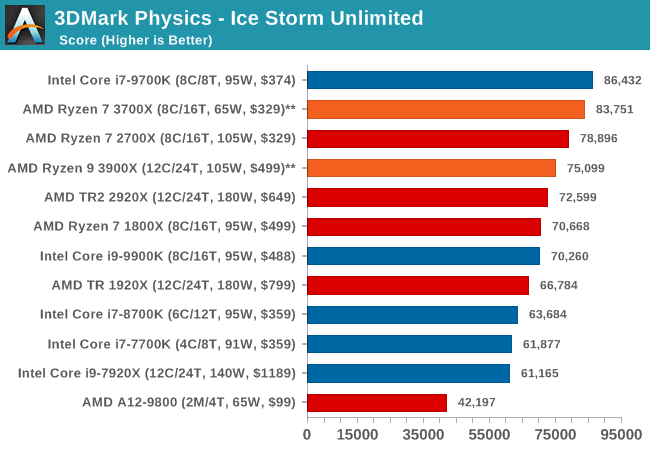
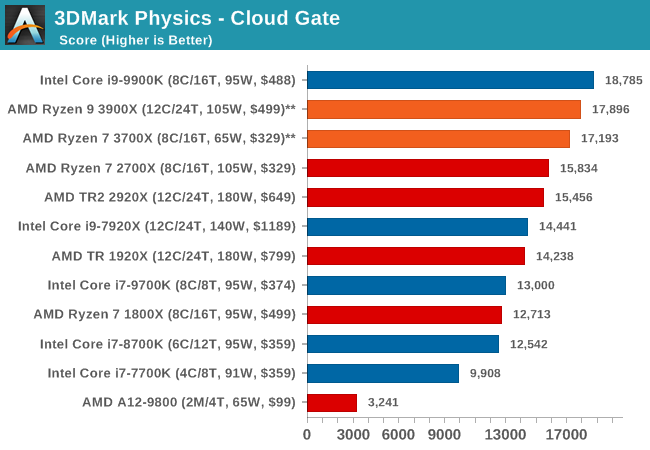
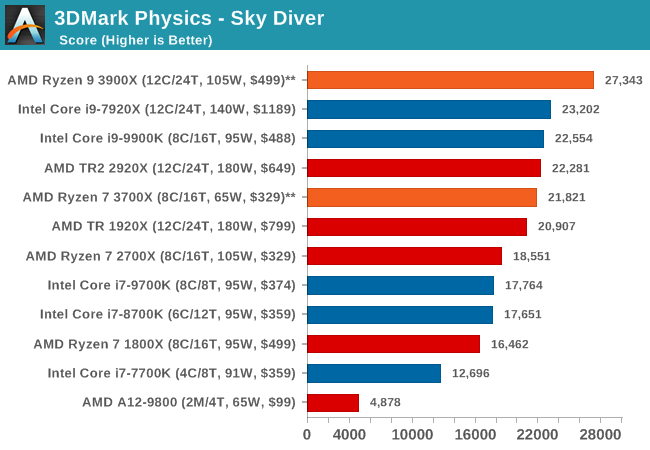
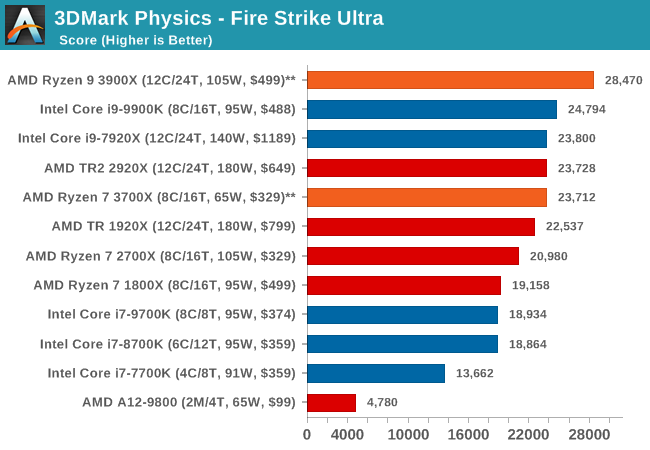
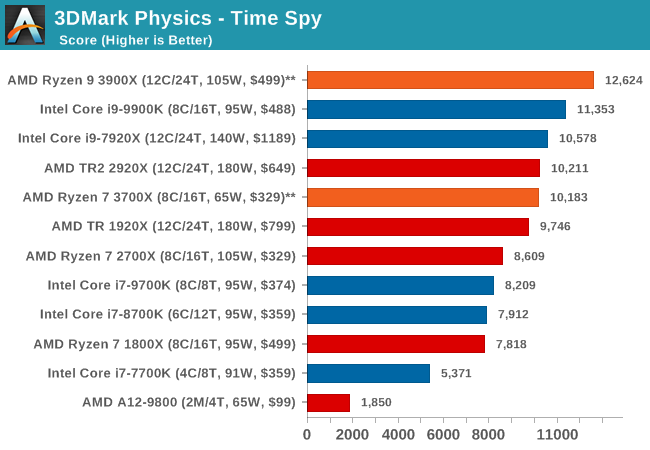
The older Ice Storm test didn't much like the Core i9-9900K, pushing it back behind the R7 1800X. For the more modern tests focused on PCs, the 9900K wins out. The lack of HT is hurting the other two parts.
GeekBench4: Synthetics
A common tool for cross-platform testing between mobile, PC, and Mac, GeekBench 4 is an ultimate exercise in synthetic testing across a range of algorithms looking for peak throughput. Tests include encryption, compression, fast Fourier transform, memory operations, n-body physics, matrix operations, histogram manipulation, and HTML parsing.
I’m including this test due to popular demand, although the results do come across as overly synthetic, and a lot of users often put a lot of weight behind the test due to the fact that it is compiled across different platforms (although with different compilers).
We record the main subtest scores (Crypto, Integer, Floating Point, Memory) in our benchmark database, but for the review we post the overall single and multi-threaded results.
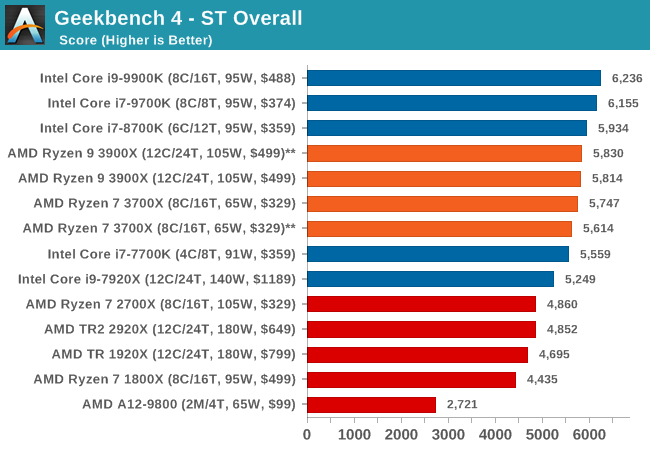
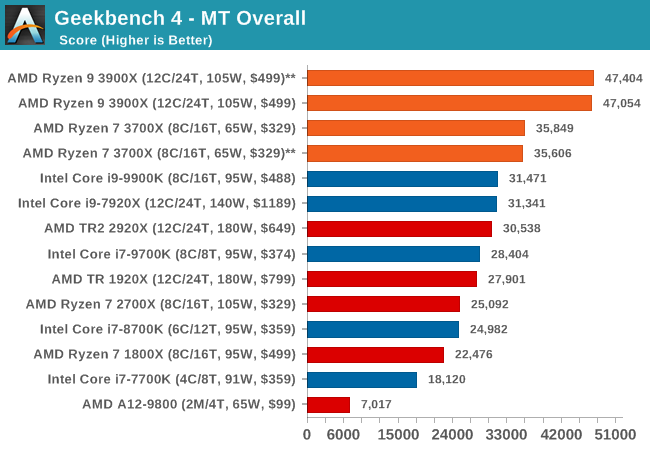










447 Comments
View All Comments
Mugur - Monday, July 8, 2019 - link
You don't know what boost means, then... All cores overclock has nothing to do with boost.Xyler94 - Monday, July 8, 2019 - link
Now I know you're an idiot. That's single core boost, not all core. Intel doesn't even state all core boost... except on a single product, the 9900KS, which is a last ditch effort to be like "Hey guys, we can hit 5ghz all core! don't look at the Ryzen Chips... please!"FYI, AMD hit 5ghz all core before Intel did, with the terrible FX9590 or something like that. It was not a good CPU.
Tkan215 - Monday, July 8, 2019 - link
this mean AMD can have great clock boost easily with time if intel can go from 4.0 to 5.0 ghz wall . Amd most likely can in the futuresor - Sunday, July 7, 2019 - link
The gaming benchmarks are mostly flat, AMD and Intel within a 1-2% margin of error.If you look at the one big win for Intel, do you have a 712hz monitor that AMD just can’t keep up with at a paltry 655fps?
Korguz - Sunday, July 7, 2019 - link
Maxiking still faster by 5%, and probably costing MORE for that 5%.. no thanks... seems intel is also dreaming about 5 ghz. you are criticizing amd for doing something they havent really been able to do in years.. so go by intel cpus, and pay a lot more....Mahigan - Sunday, July 7, 2019 - link
Wow.. you're angry. I think you take this far too seriously.wilsonkf - Sunday, July 7, 2019 - link
Are the tests re-run on Intel CPUs? 9900K seems to be losing more ground to 9700k than when they were launched. Is it the effect of patches on Intel HT CPUs?RSAUser - Monday, July 8, 2019 - link
Comment above Anand tech states no zombie mitigation, plus not 1903 which forces those patches to be enabled.Meteor2 - Sunday, July 14, 2019 - link
Might be related to the Spectre patches. Can't remember the timing between those and the 9000 series.spaceship9876 - Sunday, July 7, 2019 - link
I was hoping that you would clock the 2700x, 3700x and intel chip with the same manual clock speeds so that we can see a real IPC comparison between zen+, zen2 and intel.